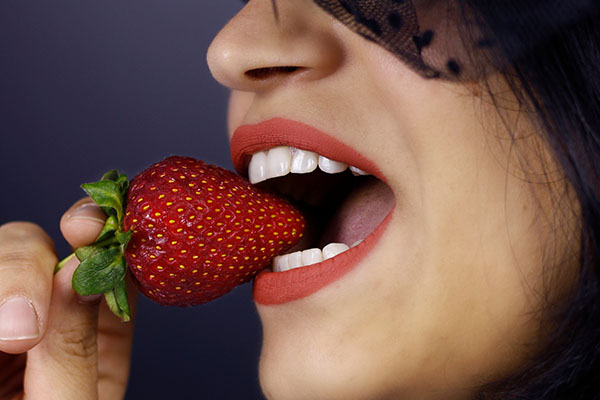 For those who suffer from damaged teeth, veneers can offer a natural-looking, long-lasting option to restore a beautiful and healthy smile. However, patients with these dental restorations should take extra care to protect them. Some dietary changes may be necessary for complete care.
For those who suffer from damaged teeth, veneers can offer a natural-looking, long-lasting option to restore a beautiful and healthy smile. However, patients with these dental restorations should take extra care to protect them. Some dietary changes may be necessary for complete care.
Foods and beverages that can damage veneers
Most foods that are unhealthy for natural teeth are also unhealthy for veneers. However, even some healthy choices require extra care, preparation, or moderation for those with this type of dental work.
Hard, crunchy foods
Anything that places excessive pressure on veneers can cause damage to the surface or bond. Biting directly into hard or crunchy foods can lead to damage, especially if it happens on a regular basis. Patients should take care when eating certain types of foods, including:
- Carrots
- Whole apples
- Corn on the cob
- Extra-crunchy chips, such as corn or kettle-cooked
- Hard candies
When possible, cut fruits and veggies into smaller pieces and chew on the side when eating crunchier foods. Hard candies are not good for overall dental health and should be avoided altogether.
Tough, chewy foods
Foods that are tough or hard to chew can also be risky. These items can become lodged between teeth and along the gum line, creating more opportunities for bacteria and decay. Thick-crusted breads, tough cuts of meat, jerky, dried fruits, and sticky candies can also loosen veneers, which will then require prompt repair or replacement.
Alcohol
Studies have shown that excessive alcohol consumption can hamper saliva production and increase the risks for oral cancer. In addition, alcohol can lessen the strength of the adhesives used to hold veneers in place. Along with limiting the number of alcoholic beverages consumed, patients should also avoid using alcohol-based mouth rinses, as these can have the same weakening effect.
Dark or acidic foods and beverages
Veneers are susceptible to staining. However, traditional whitening treatments are not effective or safe for these restorations. Therefore, patients should avoid or limit choices known to cause stains, including coffee, tea, soft drinks, and red wine. Highly acidic foods and drinks can also affect the look and strength of the veneer material. Rinse the mouth or brush right away after consuming these kinds of items, such as citrus fruits and tomatoes.
Other habits to avoid with veneers
As well as dietary choices impacting the appearance and longevity of veneers, some poor practices can be just as harmful. Crunching down on cold ice is an unhealthy habit for all patients, but especially those who wear veneers. Just like eating crunchy foods, this habit can damage the porcelain and wear down the bonding agent. Any type of tobacco use can lead to unsightly staining, deterioration, and higher cancer risks. Opening packages or pulling apart objects with the teeth is incredibly dangerous and can easily cause a dental emergency. Finally, poor oral hygiene practices can impair the look and durability of veneers.
Conclusion
Small dietary and lifestyle changes can make a large impact on the look and lifespan of dental veneers. In addition to these tips, patients should follow all instructions from the dentist for lasting results.
Request an appointment or call Johns Creek Dentistry at 770-623-1427 for an appointment in our Johns Creek office.
Recent Posts
You can cover up imperfections in your teeth with dental veneers, thin shells of porcelain that fit over your teeth, and bond to them. Veneers can last for at least a decade, but they typically need to be replaced occasionally if a dentist must treat underlying tooth decay or gum disease. Veneers can also stain;…
If you are wanting a smile makeover, veneers are an affordable and effective option. As a restorative solution, dental veneers are custom-made shells bonded to the front of your teeth. They are made of thin composite resin or porcelain and attached with dental cement. The veneers share the same color as the natural tooth, but…
Treatments available to improve minor aesthetic issues with your teeth include dental veneers that cover up such imperfections to give your teeth a more uniform appearance. There are two separate treatments that are referred to as veneers, and while they accomplish the same purpose, they have little in common with one another otherwise.Knowing the difference…


